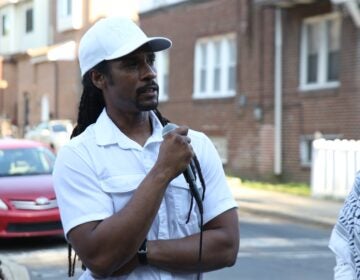Philadelphia sustainability conference hopes to put ideas into action
This weekend, the Springside Chestnut Hill Academy will host the Homegrown Institute’s Spring Conference, and a bevy of eco-minded presenters and participants will descend for the event, whose theme is “Springing Good Intentions Into Action”.
“Experiential learning” is the theme the event taking place on Saturday and Sunday, according to Homegrown Institute Executive Director Sarah Gabriel. She says the problem isn’t that people don’t know what they should do to protect the environment or eat a healthy, sustainably-sourced diet: they don’t how to implement the information they have.
“It’s about an activation of what people really want to do,” she says. Workshops will range from backyard chicken-keeping to small-scale permaculture, the myths of the anti-cholesterol diet, natural beekeeping, and “Mushrooms 101”, among many others.
Sustainability and faith presentation
Presenter Mindy Shapiro will be offering “Sustainability as Spiritual Practice”, a session introducing participants to the practice of Mussar. Shapiro has been studying this philosophy of the Jewish tradition for nine years and teaching it for three.
Mussar teaches a series of traits or virtues that help you live “a more mindful life.” Shapiro emphasizes that while Mussar has thousands of years of history in Jewish texts, its precepts bear a marked similarity to other religions, particularly Buddhism and Christianity, and are accessible to anyone regardless of their denomination.
Mussar meditations and practice, which can focus on one virtue or idea at a time over a period of weeks, leads participants to lessen their own egos in favor of service and understanding for others: “what really fulfills us is to think of the other person and not diminish them,” Shapiro says. This can work on an interpersonal scale, or it can extend to your choices about environmentally sustainable consumption.
“There are things we can do right in this very minute to change,” Shapiro says. “Every minute of our lives we are making decisions about how we’re going to live.” She’ll help introduce workshop attendees to this moment-to-moment spiritual “mindfulness” through an explanation of its concepts and then a guided mediation, after which participants will have a chance to write and share their thoughts.
Seed exchange presentation
Another presenter is also working to increase personal connections, not through spiritual practice, but through gardening. Gardener Joel Fath is a founder of the Philadelphia Seed Exchange, which took root in 2010 and has since grown to about forty active members.
The Philadelphia Seed Exchange, born out of Fath’s desire to do more seed-saving and source organic seeds locally at no cost, has two main offerings. It works with community gardeners and farmers to organize exchanges of local seeds and plants, and it also offers scientific education sessions on pollination and seed production. Many participants are able to take free seeds or “adopt” a plant with the promise of returning a new crop of seeds when the season is over.
Fath especially enjoys the diversity of Philadelphia’s horticulture scene: “our work is influenced by the communities that we participate with,” he says. “Each ethnic group or gardening group will cherish different vegetables. The diversity of the cultural backgrounds informs what people want to do.”
His workshop will focus on the fundamentals of seed-saving for small-space gardeners, and illustrate some of the science of backyard gardens, with a lesson on which easy-to-grow plants are self-fertile (like peas, beans and tomatoes) and which require cross-pollination and the genetic diversity of a larger plant population.
Aquaponics presentation
A third presenter will also offer tips on growing backyard veggies, but with a whole new spin. Virginia physicist Meg Stout will instruct workshop attendees on aquaponics, a modern combination of fish farming, or aquaculture, and hydroponic plant gardens. While this might seem new, Stout emphasizes strong evidence that the ancient Egyptians practiced a version of aquaponics, with vegetable gardens adjacent to tilapia ponds.
In an aquaponic system, fish and plants team to create a wholly sustainable closed-loop food system. Through a system of tubs, pipes, pumps, siphons and gravel-lined garden containers, water from fish tanks is pumped across gravel-rooted plants and then returned to the fish. In short, aquaponics operates a nitrogen cycle: the ammonia of the fishes’ waste products, pumped through a natural bacterial filter, is rendered into nitrates, which are prime nourishment for plants. The plants filter out these nutrients before the same water is returned clean to the fish on a continuous loop.
It might seem that aquaponics, a burgeoning international trend, would utilize more water than traditional agriculture. But the opposite is true. According to the Aquaponics Association, of the .8% of Earth’s fresh water that is accessible to human beings, 92% is utilized for agriculture. But in an aquaponic system, instead of having to repeatedly irrigate a crop, a limited amount of water can cycle again and again between the fish and the plants. As we face serious projections of global water shortages in the coming decades, aquaponics could prove an instrumental source of sustainable, high-quality food around the world.
In her own backyard aquaponics set-up (which includes goldfish and blue gills teamed with herbs, spinach, strawberries, eggplant, peppers, squash, lettuce, beets and many more) Stout notes that she hasn’t tapped into the municipal water supply for months: she replaces water lost through evaporation with rain barrels.
In her workshop, Stout will introduce participants to the concepts of aquaponics and demonstrate a few low-cost, easily constructed small-scale options for backyard practitioners. “It’s such a compelling technology for the world,” she says, “to be able to face what’s going on in the future.”
WHYY is your source for fact-based, in-depth journalism and information. As a nonprofit organization, we rely on financial support from readers like you. Please give today.




